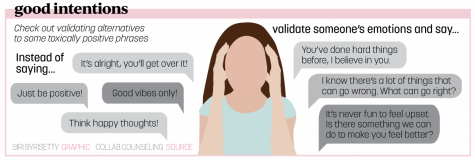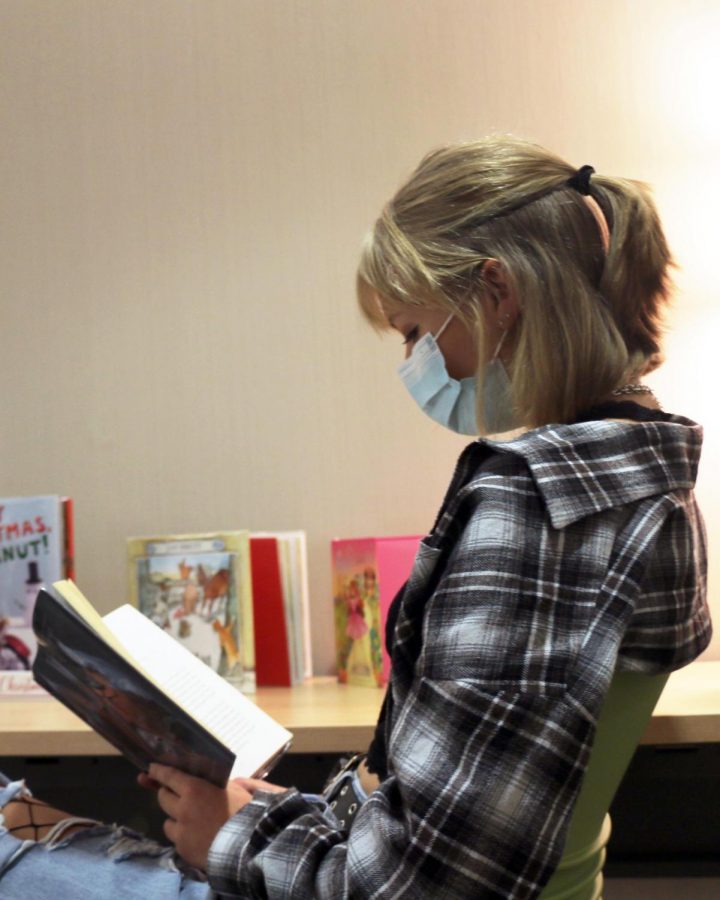During the holiday season, junior Clara Funk said she noticed the holiday spirit being forced and pushed upon her in a toxic way, especially when she said she wasn’t interested.
“I feel like sometimes people just force themselves to be happy around the holiday season,” Funk said. “Like with family, you’ll get a group of people and they’ll not like each other outside (of) the holidays, but they are expected to be happy and get along and expect you to also (get along).”
What Funk described may be evidence of toxic positivity, the dismissal or minimization of negative emotions, as well as responding to stressful situations in an overly positive and unrealistic manner rather than in a sympathetic and manageable way.
The University of Washington School of Medicine published a website titled “Right as Rain” that is dedicated to helping people feel healthy and well. Authors frequently address toxic positivity, and they clarify that although toxic positivity usually occurs with good intentions, it can cause people to feel alienated. This alienation, or minimization of someone’s feelings, can often make people feel as though their feelings are not valid and should be hidden.
Sophomore Nerland Veillard said she experienced toxic positivity, especially during the holiday season.

“If I was ever feeling down or anything like that,” Veillard said, “people would just say ‘Don’t feel down, it’s the holidays,’ or ‘Christmas just passed’. It kind of just made me feel obligated to feel happier.”
Funk said she agreed, and didn’t think toxic positivity was helpful.
“People will be like, ‘Oh why don’t you like the holidays?’ and, ‘You should be happy’ and whatnot. I’ll be okay, sure. But just telling me that doesn’t really help,” she said.
During the holiday season, social studies teacher Allen Wheeler said there are many reasons why teachers might not be feeling the holiday spirit and being uplifting.
“There’s lots of grading being done before the semester ends,” he said. “Teachers are under a lot of pressure, so you can’t expect them to be in the happy holiday mode all the time.”

Though the holidays can become stressful, Funk said she still likes to see other people happy.
“I actually like seeing other people who really enjoy (the holidays),” she said. “They’re always putting up decorations and stuff and I think it makes (everything) look fun. I just personally don’t like decorating.”
Many factors can play into people’s feelings during this time of year. According to the American Psychological Association (APA), the holidays can be hard for people who have to go through them alone, those who’ve experienced loss and people who simply have busy lives or don’t like the holidays. A recent study from the APA also found that only 8% of people feel happier during the holidays while 38% reported feeling more stressed.
Veillard said she agreed the holidays could be stressful, though she also liked some aspects of the holidays.
“I love ice skating, and I kind of like Christmas parties and seasonal stuff,” she said. “It’s just that this time of year can be hard.”
According to Wheeler, feeling forced to stay positive to ensure others’ happiness is not only a product of the holidays, but occurs outside of the holiday season as well. Wheeler said teachers are affected by toxic positivity year-round as they are always expected to exhibit a positive persona in front of their students.
“Teachers are humans, too,” he said, “and we can’t always be positive in front of students or show off a type of persona each day because suppressing our actual emotions is toxic for us as well…You need to treat (teachers) like humans and understand that they are not going to always be in one mode, because people are more layered than that.”
Along those lines, Wheeler said some teachers have various issues which might impact their positivity which students are not even aware of.
“Of course, school lives and out-of-school lives are different areas, but at the end of the day, your teachers are still the same people, you

know,” he said. “If something happens in their personal lives, (teachers) are not going to purposefully bring that(issue) into their classrooms, but their mood would be impacted.”
Funk said she is not opposed to positivity as a concept.
“There’s the toxic positivity,” she said, “but it’s not really a bad thing in general unless it’s being pushed upon people.”
Wheeler said he agreed.
“You have some naturally positive teachers, and we generally do try to create a nice environment for our students,” he said. “But teachers can’t be forced to act a certain way. Teachers are humans too, and they deserve to feel emotions in the same way as everyone else, and those emotions are not always going to be positive.”































![What happened to theater etiquette? [opinion]](https://hilite.org/wp-content/uploads/2025/04/Entertainment-Perspective-Cover-1200x471.jpg)













































![Review: “The Immortal Soul Salvage Yard:” A criminally underrated poetry collection [MUSE]](https://hilite.org/wp-content/uploads/2025/03/71cju6TvqmL._AC_UF10001000_QL80_.jpg)
![Review: "Dog Man" is Unapologetically Chaotic [MUSE]](https://hilite.org/wp-content/uploads/2025/03/dogman-1200x700.jpg)
![Review: "Ne Zha 2": The WeChat family reunion I didn’t know I needed [MUSE]](https://hilite.org/wp-content/uploads/2025/03/unnamed-4.png)
![Review in Print: Maripaz Villar brings a delightfully unique style to the world of WEBTOON [MUSE]](https://hilite.org/wp-content/uploads/2023/12/maripazcover-1200x960.jpg)
![Review: “The Sword of Kaigen” is a masterpiece [MUSE]](https://hilite.org/wp-content/uploads/2023/11/Screenshot-2023-11-26-201051.png)
![Review: Gateron Oil Kings, great linear switches, okay price [MUSE]](https://hilite.org/wp-content/uploads/2023/11/Screenshot-2023-11-26-200553.png)
![Review: “A Haunting in Venice” is a significant improvement from other Agatha Christie adaptations [MUSE]](https://hilite.org/wp-content/uploads/2023/11/e7ee2938a6d422669771bce6d8088521.jpg)
![Review: A Thanksgiving story from elementary school, still just as interesting [MUSE]](https://hilite.org/wp-content/uploads/2023/11/Screenshot-2023-11-26-195514-987x1200.png)
![Review: "When I Fly Towards You", cute, uplifting youth drama [MUSE]](https://hilite.org/wp-content/uploads/2023/09/When-I-Fly-Towards-You-Chinese-drama.png)
![Postcards from Muse: Hawaii Travel Diary [MUSE]](https://hilite.org/wp-content/uploads/2023/09/My-project-1-1200x1200.jpg)
![Review: "Ladybug & Cat Noir: The Movie," departure from original show [MUSE]](https://hilite.org/wp-content/uploads/2023/09/Ladybug__Cat_Noir_-_The_Movie_poster.jpg)
![Review in Print: "Hidden Love" is the cute, uplifting drama everyone needs [MUSE]](https://hilite.org/wp-content/uploads/2023/09/hiddenlovecover-e1693597208225-1030x1200.png)
![Review in Print: "Heartstopper" is the heartwarming queer romance we all need [MUSE]](https://hilite.org/wp-content/uploads/2023/08/museheartstoppercover-1200x654.png)



